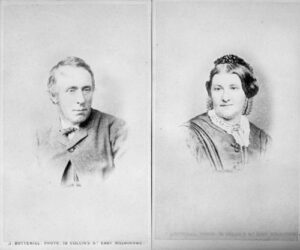Overland to China: Reader, our voyage is not a short one
12th Nov 2023 - Blog
On the first trip back to China since Covid, I climbed (on the escalator) to the Mid Levels in Hong
While reading about Thomas Gilbert and his refusal to serve in the Taranaki militia during the first war there in 1860 (read more), I came across a further objector in the horticulturist, gardener and farmer, Thomas Mason.
The Quaker Thomas Mason, who arrived with his family in 1841 and settled in Taita in the Hutt Valley, would have been surprised to find himself starring in an opera 170 years later. He was a good friend of Māori, learning the language and well-known and admired for his faith-based stand against conflict, fighting and talking up arms. He raised his sons (he had 7, plus 3 daughters) to act in a like manner, and in 1864, he and two of his sons refused to serve in the militia. Earlier, in 1845, to escape disturbances in the district, he took a break in Hobart, where he came across a friend Hōhepa Te Umuroa from the Hutt Valley, sent there as a prisoner, with a sentence of hard labour, for supposedly being a rebel, by Governor George Grey (who of us knew that New Zealand sent convicts to Tasmania?). Mason apparently was instrumental in getting the prisoners released, although Hōpeha died there of tuberculosis in 1847, his remains being returned some 150 years later. Mason returned to Taita in 1851 and spent the rest his life there, developing a substantial garden and nursery business, supplying Wellington with fruit and vegetables, and later becoming involved in local and national politics.[1]
Jenny McLeod wrote an opera on the Hōpeha incident, and it was performed, to mixed reviews, in 2012. However, Mason didn’t need the stage to act out a drama, there was theatre enough in his front garden. Some while after returning from Hobart, in in the early 1860s, he was in his garden when he saw a group of Māori with their Chief approaching, all in a somewhat threatening manner, intent on some sort of revenge for a recent incident. Mason knew them and their Chief slightly, and he remonstrated with them, showing his passivity and belief in non-violence, arguing to find a peaceful way of resolving a threatening issue. However the tension was all a bit much for Mason’s wife Jane, and she hit the chief on the face. This was a moment when life and death seemed to hang suspended, minor violence with the potential for a major response alongside the language of peace and trust. And then the Chief turned away and left with his men.[2]
 Jane Mason was originally not a Quaker, and on marrying in England in 1840, Mason resigned from the Society of Friends to avoid being disowned, and perhaps this was part of their reason for emigrating. He rejoined the Society when in Tasmania in 1847, and Jane was accepted into it.[1] Jane Mason was no doubt a good woman, but in the incident, which was an extraordinary moment of drama, she somehow seemed to deny the Quaker ideals of both herself and her husband. What stands out most of all though, was the reflection of Mason’s pacifism in the Chief’s turning away, responding peacefully to the potential loss of mana, the loss of face. The Chief understood. The refusal to fight, to use force to settle issues, to take up arms, can rise above martial and violent response.
Jane Mason was originally not a Quaker, and on marrying in England in 1840, Mason resigned from the Society of Friends to avoid being disowned, and perhaps this was part of their reason for emigrating. He rejoined the Society when in Tasmania in 1847, and Jane was accepted into it.[1] Jane Mason was no doubt a good woman, but in the incident, which was an extraordinary moment of drama, she somehow seemed to deny the Quaker ideals of both herself and her husband. What stands out most of all though, was the reflection of Mason’s pacifism in the Chief’s turning away, responding peacefully to the potential loss of mana, the loss of face. The Chief understood. The refusal to fight, to use force to settle issues, to take up arms, can rise above martial and violent response.
The portraits are of Thomas and Jane Mason. Cartes de visite J Botterill, Melbourne, Australia. Alexander Turnbull Library, Wellington, New Zealand. /records/23060235
[1] James W. Brodie. ‘Mason, Thomas’, Dictionary of New Zealand Biography, first published in 1993. Te Ara – the Encyclopedia of New Zealand, https://teara.govt.nz/en/biographies/2m38/mason-thomas (accessed 26 May 2023)
[2] Adams, K. R., The growth and development of the Society of Friends in New Zealand, 1840-1920. MA Thesis, University of Canterbury, 1986. pp. 219.
12th Nov 2023 - Blog
On the first trip back to China since Covid, I climbed (on the escalator) to the Mid Levels in Hong
7th Oct 2025 - Rare and Early Books
A collection of articles on early and rare New Zealand books of the 19th C, posted from 2022 onwards, has